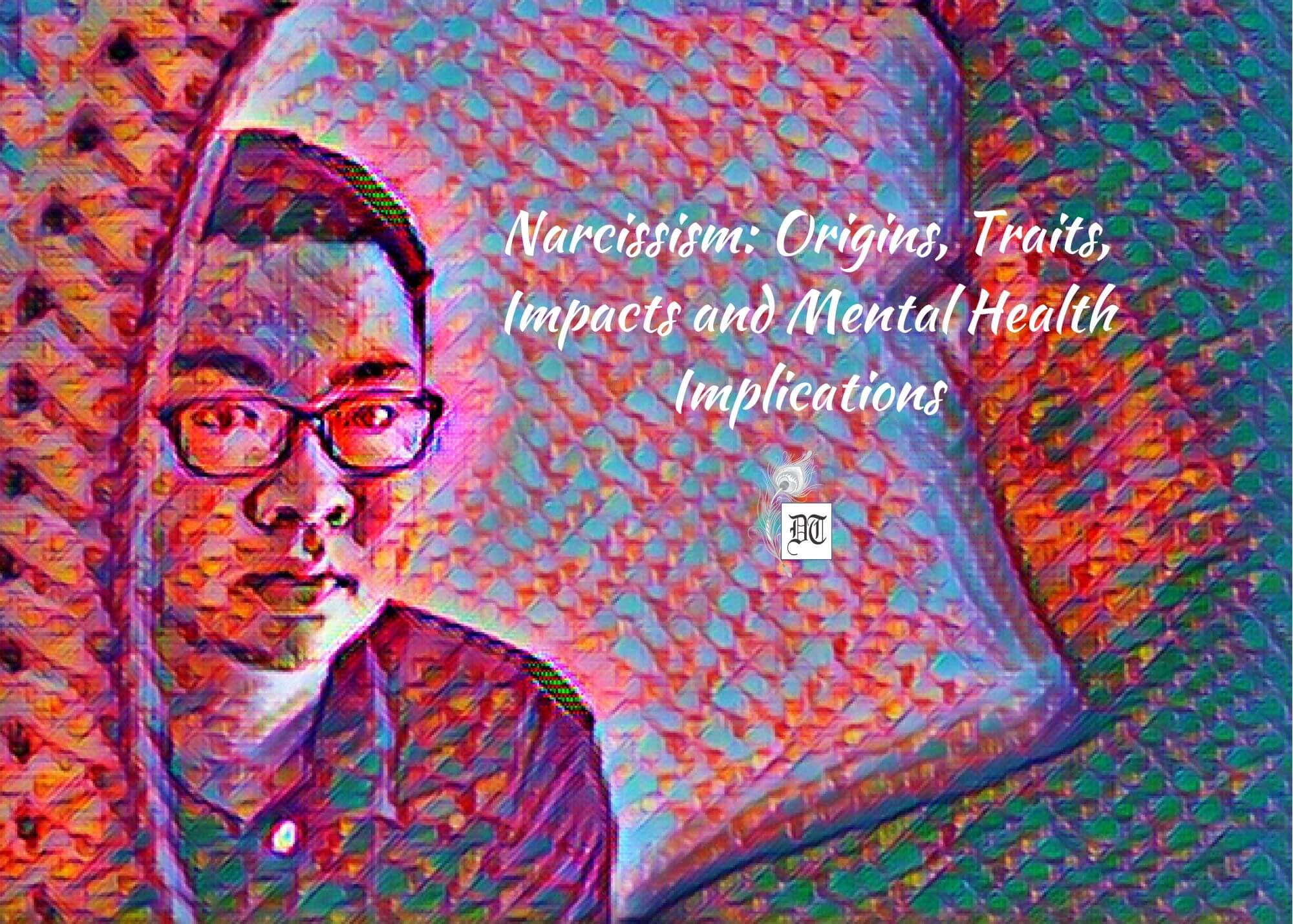Narcissism, a trait rooted in early psychologists, involves excessive self-preoccupation, admiration, and a lack of empathy, impacting relationships, work, and mental health, elucidates Dhiraj exclusively for Different Truths.
The term narcissism, or, in other words, pathological self-absorption, was first used by a British essayist and physician named Havelock Ellis in 1898. The concept of narcissistic personality was later popularized by Sigmund Freud in 1914 in his paper titled On Narcissism: An Introduction, which laid the foundation for understanding narcissistic personality traits and their development. Following Freud’s initial formulation, psychologists like Heinz Kohut and Otto Kernberg further explored the idea of narcissistic personality and made contributions to our understanding of narcissism and its manifestations, diagnostic criteria, and underlying psychological mechanisms.
Narcissism is defined as a psychological trait characterized by an excessive preoccupation with oneself, an inflated sense of self-love and self-importance, an insatiable need for recognition, admiration, and validation, and a lack of empathy for others. The term “narcissism” comes from Greek mythology, where Narcissus was a character who fell in love with his reflection. While some self-interest and self-focus are normal, pathological narcissism involves an extreme and maladaptive self-centeredness that harms relationships, personal well-being, and overall functioning.
Narcissistic personality disorder affects a far greater number of people than we think.
Today, with the ambitious and materialistic world around us, narcissistic personality disorder affects a far greater number of both males and females equally than we think. This disorder starts emerging in early childhood but may show development later in the older years. While some children may exhibit narcissistic traits, such behaviours are often considered normal for their age and do not necessarily indicate that they will develop narcissistic personality disorder later in life.
Key Characteristics and Behaviours Associated with Narcissism
Narcissists have an exaggerated sense of their abilities, achievements, and importance. They are daydreamers to a great extent. They often believe they are special, unique, or superior to others. They constantly seek admiration, attention, and validation from others. They thrive on being praised, admired, and recognized for their ‘perceived’ worth, accomplishments, or qualities. They struggle to recognize and respond to the emotions and needs of others, as their primary focus is on themselves.
Narcissists may exploit or manipulate others to fulfill their desires and maintain their inflated self-image. They may use charm, deception, or coercion to gain control, admiration, or personal gain. Paradoxically, beneath the facade of grandiosity lies fragile self-esteem. Narcissists are highly sensitive to opposition, criticism, and rejection, and they may respond with rage, violence, defensiveness, or withdrawal when their self-image is threatened.
It is important to note that narcissism is considered a personality disorder when it significantly impairs an individual’s functioning and well-being, causing distress and negatively impacting their relationships, work, and overall life satisfaction. Narcissistic personality disorder is a mental health condition characterized by an exaggerated sense of self-importance. Individuals afflicted with this disorder constantly seek excessive attention and admiration, yearning for others to recognize and admire them. Often, they struggle to understand or empathize with the emotions of those around them. Contrarily, they have deep-seated self-worth issues hidden behind their outward display of extreme confidence, and even the slightest criticism can easily upset them.
This disorder wreaks havoc in various aspects of an individual’s life, including family and relationships.
This disorder wreaks havoc in various aspects of an individual’s life, including family and relationships, work, and one’s health and well-being. Those with narcissistic personality disorder often experience chronic irritation, dissatisfaction, and disappointment when they do not receive the special treatment or adulation, they believe they deserve. Consequently, their relationships tend to be fraught with difficulties and unfulfillment, leading others to find their company less appealing. The symptoms and degree of Narcissistic Personality Disorder (NPD) can vary among individuals.
Most people with this disorder usually
- Possess an unreasonably inflated sense of self-importance, requiring constant and excessive admiration.
- They believe that they deserve special privileges and treatment.
- Expect to be seen as superior even in the absence of notable work or achievements.
- Exaggerate their accomplishments and talents.
- The fantasy of achieving success, dominance, brilliance, beauty, or finding the ideal partner
- They consider themselves superior to others and only associate with individuals they perceive as equally exceptional.
- Display critical attitudes towards individuals they deem insignificant.
- Exploit and manipulate others to fulfill their desires.
- Display an inability or unwillingness to acknowledge the needs and feelings of others.
- Feel envious of others while believing others envy them.
- Behave arrogantly, frequently boasting and appearing conceited.
- Insist on having the best of everything.
Individuals with narcissistic personality disorder struggle to handle anything they perceive as opposition.
Simultaneously, individuals with narcissistic personality disorder struggle to handle anything they perceive as opposition or criticism.
Consequently, they may:
- They become impatient, rash, or angry when they do not receive special recognition or treatment.
- Encounter significant challenges in interpersonal relations.
- Respond with rage or contempt, attempting to belittle others to assert their superiority.
- Experience difficulties managing their moods, emotions, and interpersonal communication.
- Encounter significant problems coping with stress and adapting to change.
- Withdraw from or avoid situations as per their moods.
- Experience feelings of depression and moodiness due to their inability to attain perfection.
- They harbour secret insecurities, lack of trust, low self-esteem, humiliation, and fear of being exposed.
People with narcissistic personality disorder often resist acknowledging that something may be wrong. If they do not recognize this phenomenon, it is more likely to be due to symptoms of depression, substance abuse, or another mental health issue. Moreover, their fragile self-esteem may make it challenging for them to accept and commit to treatment, perceiving it as an assault on their self-worth.
Impacts on Personal Relationships and Family Dynamics
Narcissistic traits can have implications for intimate relationships and family dynamics. The pursuit of individual goals and self-interests may sometimes overshadow the importance of collective well-being and harmonious family relationships. Additionally, the interplay of traditional gender roles and societal expectations can influence the manifestation of narcissistic behaviours within interpersonal relationships.
Narcissists often view others as objects to fulfill their desires, and this objectification extends to the realm of sexuality. They may prioritize their pleasure and satisfaction, ignoring all the norms and moral and ethical boundaries. Narcissists possess a magnetic charm and the ability to seduce others. They may use their sexual prowess as a means to manipulate and control their partners, using sex as a tool for gaining admiration, control, or validation. This manipulation can create a power imbalance within the sexual relationship, eroding trust and intimacy, and finally leading to the closure of the relationship.
True emotional intimacy requires empathy and a genuine connection with one’s partner.
True emotional intimacy requires empathy and a genuine connection with one’s partner. However, narcissists struggle with these aspects of intimacy due to their self-centred nature and limited capacity for empathy. This deficiency often extends to the sexual realm, where narcissists may prioritize their gratification. Narcissists may engage in infidelity as a means to fulfill their insatiable need for recognition, validation, and admiration. They may feel entitled to seek sexual experiences outside the relationship, disregarding the devastating emotional consequences for their partner. This disregard for fidelity and emotional commitment further leads them to low self-worth and self-esteem and, finally, to a depressed state.
The children of narcissistic parents suffer a lot. Narcissistic parents often exhibit parenting styles that revolve around their own needs and desires rather than prioritizing the emotional well-being and development of their children. They may engage in excessive control, emotional manipulation, and neglect, leaving their offspring feeling invalidated, unworthy, and deprived of a healthy parental bond.
Growing up with a narcissistic parent exposes children to emotional abuse and manipulation. This can lead to long-lasting trauma, self-doubt, and a diminished sense of self-worth in the offspring. Children of narcissistic parents often internalize the dynamics they witness at home, which can manifest in their relationships. They may find it difficult to trust others and gravitate towards unhealthy or abusive relationships. They may struggle with low self-esteem, anxiety, depression, or a sense of emptiness. The constant need for recognition, validation, and approval, coupled with a fear of abandonment, can impact their ability to form healthy relationships and lead fulfilling lives.
Narcissistic Personality and Work Attitude
Narcissistic personality traits and a lazy or no-work attitude can intersect in certain individuals, although it is important to note that not all individuals with narcissistic traits exhibit laziness or a lack of work ethic. Narcissistic individuals often have an inflated sense of entitlement and may believe they deserve special treatment or privileges without putting in the hard work or necessary efforts.
They typically have a strong need for recognition, admiration, and validation from others.
They typically have a strong need for recognition, admiration, and validation from others. If they perceive work tasks as not providing the desired level of recognition or admiration, they may lack the motivation to engage in those tasks wholeheartedly. They may prioritise activities that bring them immediate praise, pleasure, or attention rather than focusing on long-term goals or responsibilities.
They always demand absolute control over others and often struggle to collaborate effectively with others. Their self-centred focus may lead them to prioritize their own needs and desires over the demands of the workplace. In some cases, narcissistic individuals may use manipulation and exploitation to navigate their work environments. They may engage in tactics such as delegating tasks to others, taking credit for their subordinates’ work, or exerting influence to avoid their workload. These behaviours can create a perception of laziness or a lack of work ethic, as they prioritise their interests at the expense of others’ contributions.
Implications for Mental Health
While narcissistic individuals often project an image of confidence and grandiosity, beneath their surface lies a fragile self-esteem and vulnerability that can lead to depression and anxiety. When they are faced with challenges or failures that contradict their inflated self-perception, they experience intense feelings of disappointment and self-doubt.
Narcissists tend to have a strong fear of failure and criticism, as it threatens their idealised self-image.
Narcissists tend to have a strong fear of failure and criticism, as it threatens their idealised self-image. The pressure to maintain their self-perceived perfection can lead to chronic stress and anxiety. They often feel perceived difficulties in relationships, perceived feelings of isolation, and a lack of perceived emotional support that can contribute to feelings of loneliness and despair, which are common features of depression. They often have unrealistic expectations of themselves and others. They may expect constant admiration, success, and perfection, and when these expectations are not met, they may experience profound disappointment and frustration.
In summary, breaking free from the grip of narcissistic disorder requires self-reflection, living within and respecting boundaries, and satisfaction with the status quo. Recognising one’s worth and seeking therapy can be instrumental in healing. Developing a healthy sense of self and cultivating open communication with close ones and empathy can pave the way for a fulfilling life without seeking others’ validation and recognition.
Bibliography:
Baker HS and Baker MN (1987), Heinz Kohut’s self-psychology: an overview, The American Journal of Psychiatry, 144(1):1–9. DOI: 10.1176/ajp.144.1.1 PMID: 3541648
Bushman, B. J., & Baumeister, R. F. (2002). Does self-love or self-hate lead to violence? Journal of Research in Personality, 36, 543-545.
Fonagy (Eds. ), Freud’s “On Narcissism: An Introduction,” Yale University Press, New Haven
Foster, J.D., Shrira, I., & Campbell, W.K. (2006). Theoretical models of narcissism, sexuality, and relationship commitment. Journal of Social and Personal Relationships, 23, 367-386.
Foster, J.D., Shrira, I., & Campbell, W.K. (2006). Theoretical models of narcissism, sexuality, and relationship commitment. Journal of Social and Personal Relationships, 23, 367-386.
Freud, S. (1914/1991). On narcissism: An introduction. In J. Sandler, E. Person, & P.
Kernberg O.F. (2021), Thoughts on Transference Analysis in Transference-Focused Psychotherapy. Psychodynamic Psychiatry. 49: 178-187. PMID 34061654 DOI: 10.1521/pdps.2021.49.2.178
Robins, R. W., & Beer, J. S. (2001). Positive illusions about the self: Short-term benefits and long-term costs. Journal of Personality and Social Psychology, 80, 340–352.
Vohs, K.D., Mead, N., & Goode, M. (2006) The psychological consequences of money, Science, 314, 1154-1156.
Wallace, H. M., & Baumeister, R. F. (2002). The performance of narcissists rises and falls with the perceived opportunity for glory. Journal of Personality and Social Psychology, 82, 819–834.
Watson, P. J., Taylor, D., & Morris, R. J. (1987). Narcissism, sex roles, and self-functioning Sex Roles, 16, 335-349
Zhang, L., & Baumeister, R. F. (2006). Your money or your self-esteem: Threatened egotism promotes costly entrapment in losing endeavours. Personality and Social Psychology Bulletin, 32, 881–903.
Picture design by Anumita Roy





 By
By
 By
By
 By
By
 By
By